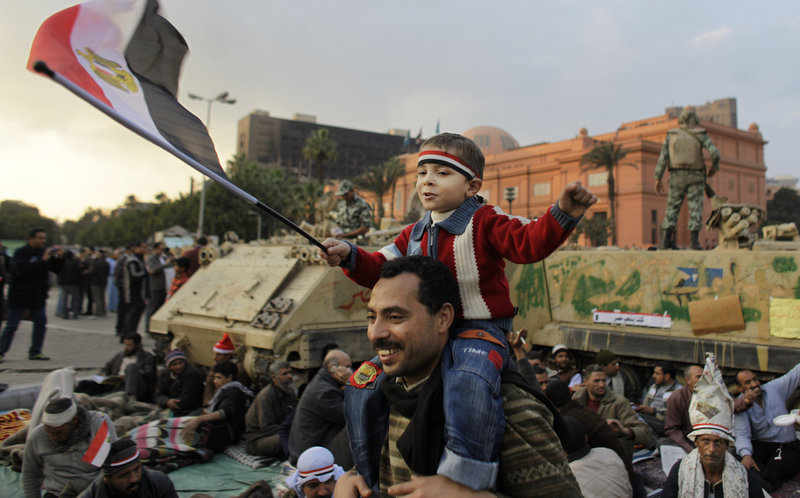CAIRO — Hopes for a road map on how to bring political reform to Egypt faded Monday, with anti-government activists casting doubt on the legitimacy of talks and thousands of protesters entering their third week as a noisy occupation force in the heart of the nation’s capital.
Many activists showed little confidence the government would follow through with a pledge announced by Vice President Omar Suleiman to clamp down on corruption, widen press freedoms, lift emergency law when conditions warrant and form a committee to amend the constitution – landmark concessions for Egypt. Instead, they insisted that President Hosni Mubarak could not remain in power.
Leaders of the Muslim Brotherhood opposition group announced they will not continue any dialogue unless the demands lodged by Tahrir Square protesters for an end to Egypt’s repressive military regime are met. Members of the group had been the most significant anti-government presence at weekend meetings with government officials, which did not include several well-known opposition leaders.
“We support the demands of the people. At the top of these demands is the stepping down of President Mubarak ... before the end of this week, not September,” said Issam al-Aryan, a member of the brotherhood’s executive bureau.
Longtime opposition leader Ayman Nour, who was jailed for four years after running against Mubarak for president in 2005, said the government is deceiving Egyptians.
In an interview, he said government talks with certain opposition groups, prominent academics, young protest organizers and businessmen were an attempt to placate demonstrators without inviting significant members of the opposition, including Nobel Peace laureate Mohammed Elbaradei, or taking genuine steps at constitutional reform or removing Mubarak from power.
“The government is not really interested in dialogue. It did not hold any talks with the competition or possible candidates who could run against it in September,” Nour said.
While the Muslim Brotherhood is a significant movement in Egypt, it was not allowed to enter the talks until its leaders agreed the group would not run in the presidential elections, he said.
“That’s why Elbaradei and I were not invited. The government met with small opposition parties that were founded with the blessing of the state. They’re the puppet opposition. I bet Suleiman can’t even name those parties,” he said. “The regime doesn’t see that the presence of Mubarak as president is the reason behind this crisis. They’re trying to string these talks out into limbo. But the people won’t stop until the revolution is complete.”
The capital continued to stagger back to its feet Monday, with the nighttime curfew shaved back to 8 p.m. and more and more Egyptians back at work.
But as newly reopened banks linked for the first time with international traders, the Egyptian pound sank to its lowest level in three years, and there were worsening economic fears from a crisis that is costing the country an estimated $310 million a day.
The army sought to regain access to the Mugamma — the hulking, 14-story headquarters of the legendary Egyptian bureaucracy, where 18,000 public servants and at least an equal number of Egyptian civilians normally haggle each day over passport stamps, visa forms, birth certificates and piles of other essential papers requiring government stamps.
But reopening the edifice proved impossible as a result of intransigent protesters who have turned the crucial central square in front of the building into an increasingly elaborate and boisterous tent city whose occupants have vowed to leave only when Mubarak does.
“These people that came here won’t leave except as corpses,” said Aya Elkabbany, a 25-year-old dental school teacher who said the president’s departure is the only possible end to what are now 14 days of protests.
With both sides seemingly intransigent, some analysts are suggesting that only in pushing Mubarak swiftly to engage in full-throttle reforms, including dissolving parliament and holding immediate new elections in which the protesters could conceivably elect a new majority in parliament, can opponents hope to gain anything tangible out of the crisis.
“The problem the opposition faces is they’re not institutionalized; they don’t have anything behind them other than the power of the crowd. And the longer this goes on, the smaller the crowds could get, and the stronger Mubarak and Suleiman and all those guys get,” said Tarek Masoud, assistant professor of public policy at Harvard University.
“If the government can seem to be making concessions, pretty soon only the hard-core protesters will remain. If they’re camping out in Tahrir and singing songs, you can direct traffic around them, and that’s the end of that.”
Copy the Story Link
Send questions/comments to the editors.



Success. Please wait for the page to reload. If the page does not reload within 5 seconds, please refresh the page.
Enter your email and password to access comments.
Hi, to comment on stories you must . This profile is in addition to your subscription and website login.
Already have a commenting profile? .
Invalid username/password.
Please check your email to confirm and complete your registration.
Only subscribers are eligible to post comments. Please subscribe or login first for digital access. Here’s why.
Use the form below to reset your password. When you've submitted your account email, we will send an email with a reset code.